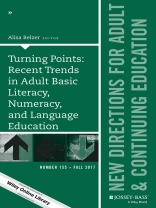Milestones for adult basic education include:
* It was first federally funded in 1964.
* The National Literacy Act passed in 1991.
* The Workforce Investment Act (WIA) of 1998 was enacted.
The field then remained relatively static until 2014 when:
* a new version of the GED? test was launched,
* new content standards were developed,
* new data on adult cognitive skills were released, and
* the Workforce Innovation and Opportunity Act (WIOA), with its laser focus on employment and training, was enacted.
This volume reviews where the field is in relation to these turning points and discusses where it could go. Taking up critical discussions of the many recent and influential changes as well as topics of enduring interest, this volume will be valuable to practitioners, researchers, and policy makers.
This is the 155th volume of the Jossey Bass series New Directions for Adult and Continuing Education. Noted for its depth of coverage, it explores issues of common interest to instructors, administrators, counselors, and policymakers in a broad range of education settings, such as colleges and universities, extension programs, businesses, libraries, and museums.
Tabella dei contenuti
Editor’s Notes 5
Alisa Belzer
1. Focusing or Narrowing: Trade-Offs in the Development of Adult Basic Education, 1991-2015 11
Alisa Belzer
A critical analysis of how policy has shaped the field of adult basic education over the last 25 years.
2. The Workforce Investment and Opportunity Act: New Policy Developments and Persistent Issues 19
Erik Jacobson
This chapter details how the most recent authorization of federal funds for adult basic education differ fromprevious statutes and what challenges may be faced in implementing it.
3. PIAAC: Focusing Adult Learning on Building Adult Competence 29
Sondra Gayle Stein
The OECD Program for International Assessment of Adult Competencies (PIAAC) measures cognitive kills in countries around the world, but this chapter demonstrates how the frameworks that informed task development can also be used to inform and improve instruction.
4. High School Equivalency Assessment and Recognition in the United States: An Eyewitness Account 41
Lennox Mc Lendon
This chapter describes some key challenges in launching the new GED® test in 2014 and how these led to two new entrants into the field of high school equivalence testing.
5. Technology for Innovation and Change in Adult Basic Skills Education 51
David J. Rosen, Jenifer B. Vanek
This chapter discusses the ways in which technology is influencing adult basic education practice and the new opportunities and challenges it provides for learners and practitioners.
6. Immigrants to the United States and Adult Education Services 61
Clarena Larrotta
Both documented and undocumented immigrants who arrive in the United States need educational services. Yet their options and opportunities are delineated by their immigration status; community and churchbased organizations take up some of the slack where federally funded programs fall short.
7. Professional Development and Professionalization in the Field of Adult Basic Education 71
Cristine Smith
This chapter provides a description of the growth of professional development systems and improvements in quality and access in professional development offerings in adult basic education. A discussion of efforts to professionalize the workforce concludes the chapter.
8. Research Updates: Reading, Numeracy, and Language Education 83
Daphne Greenberg, Lynda Ginsburg, Heide Spruck Wrigley
This chapter synthesizes recent research in each of the key domains of adult basic education.
9. Conclusion 95
Esther Prins
The conclusion focuses on the many gaps in the research base, which are indicated by the turning points described in the preceding chapters.
Index 105
Circa l’autore
Volume Editor:
Alisa Belzer is an associate professor at the Graduate School of Education, Rutgers University.












